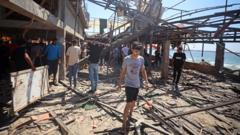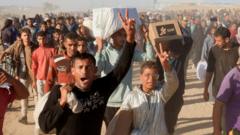Residents of Dahiya, a suburb of Beirut, have been ordered to evacuate amid escalating tensions following rocket fire towards Israel, marking a significant moment since last November's cease-fire.
Israel Issues Evacuation Order for Residents Near Beirut

Israel Issues Evacuation Order for Residents Near Beirut
Evacuation command in Lebanon's Dahiya neighborhood signals tensions as cease-fire is tested
The Israeli military has issued an evacuation order for residents in the Dahiya neighborhood of Beirut, in a move that reflects rising tensions following a rocket attack on northern Israel. This directive, the first since the U.S.-negotiated cease-fire came into effect last November, targets those living approximately 300 yards from a specific building linked to Hezbollah, marking a sharp escalation.
Avichay Adraee, a spokesperson for the Israeli military, publicized a map indicating the threatened area, emphasizing the urgency of the evacuation. This situation escalated after a series of rocket and drone strikes by Hezbollah in support of Hamas in October, as both groups engaged in intensified hostilities. Since the cease-fire, Israeli forces have struck various locations in Lebanon, yet the Dahiya region, stronghold of Hezbollah, had remained untouched until now.
Recent developments saw air raid sirens in northern Israel as projectiles were fired from Lebanon, prompting immediate military responses. In statements made by Israeli Defense Minister Israel Katz, he warned of retaliatory strikes in Beirut should assaults on Israeli communities persist.
Reports from Dahiya indicate frantic scenes, with local residents reacting to the evacuation notice. Elie Hachem, the director of St. Therese Hospital nearby, described the atmosphere as chaotic but reassured that the hospital staff was focusing on maintaining calm despite the threat. The building designated for evacuation continues to hold significance in this ongoing regional conflict, leaving many residents anxious for their safety amidst this renewed volatility.
Contributors to this report include Hwaida Saad and Dayana Iwaza in Beirut.






















